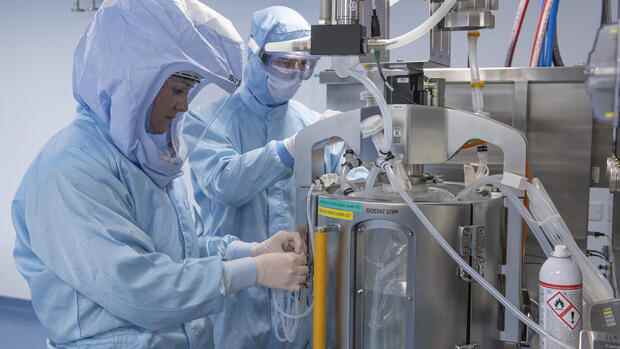The pharmaceutical companies defend their patents.
(Photo: dpa)
Brussels Developing countries should be allowed to produce Covid-19 vaccines regardless of patent protection. That is at the heart of an agreement between the EU, the US, South Africa and India. They want to work together in the World Trade Organization (WTO) to have the protection lifted. This emerges from a document that the Handelsblatt was able to see. The Reuters news agency first reported on it.
According to this, developing countries should be allowed to revoke the protection by decree without negotiations with the patent owner. This involves less effort than the usual system of compulsory licenses. The vaccines then produced should also be allowed to be exported. Without this regulation, setting up vaccine production would hardly be worthwhile.
In addition, the new vaccine producers should be able to market their products without further clinical studies, because these have already been carried out by the patent holders.
The planned patent cancellation does not apply to countries that already exported large-scale Covid-19 vaccines in 2021, but aims to enable new production sites.
Top jobs of the day
Find the best jobs now and
be notified by email.
“It’s a long-overdue about-face by the EU,” said Green MEP Anna Cavazzini. “Finally, the countries of the Global South can use it to produce their own Covid vaccines. This will help get the pandemic under control worldwide.”
>> Read here: Vaccine production in Kenya and 15 new research projects – Moderna pushes Africa strategy
CDU MP Peter Liese was also positive: “I’m very happy about the agreement because it ends an annoying discussion that doesn’t address the actual problem,” he said. “It is important to also support low-income countries with infrastructure.”
Approval applies only to vaccines, not drugs
The World Trade Organization WTO has not yet accepted the proposal. Not only the EU, but also Switzerland and Great Britain had campaigned for patent protection. They are not involved in the compromise and could vote against it in the WTO. Only a unanimous result would invalidate patent protection.
The discussion about patent protection has existed since the first vaccines were fully developed. The pharmaceutical companies refused to hand over their development. The EU questioned whether this move would really lead to faster production of vaccines. Especially at the beginning of the pandemic, it was more of a lack of many different raw materials that led to the shortage of vaccines.
Instead, the German company Biontech recently presented mobile production modules with which it wants to produce vaccines in Africa. The company expects production to begin this way in the second half of 2023. After an introductory phase, Biontech wants to pass on know-how to local partners and then enable independent operation of the production facilities. The second major mRNA developer Moderna recently announced a €500 million investment in a manufacturing facility in Kenya.
The compromise on patent protection only applies to vaccines, not drugs used to treat Covid disease. “The compromise remains half-baked,” said Cavazzini.
More on this: Vaccine from the mobile container factory: How Biontech wants to expand the vaccine supply in Africa
